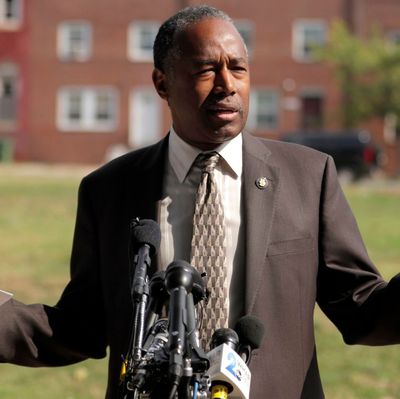
Secretary of Housing and Urban Development Ben Carson traveled to Baltimore on Wednesday to do damage control. His boss, President Trump, had described the city in a series of recent tweets as “a disgusting, rat and rodent infested mess” where “no human being would want to live.” The president meant this to reflect badly on Representative Elijah Cummings — the Democrat who represents half the city in Congress — and by inference, the innate filthiness of the black people who comprise the majority of its population. Naturally, many residents took offense. The Baltimore Sun’s editorial board published an op-ed describing the president as “vermin.” Other observers called him a racist. Carson, a former Baltimorean and the only black person in Trump’s Cabinet, arrived to affirm Trump’s point that Baltimore was in rough shape but that his administration was committed to fixing it, rather than merely ridiculing it to satisfy a personal grievance.
One problem was that nothing resembling a concrete plan had been submitted by either Carson or the president. When asked by reporters on Wednesday whether he’d made investments in the area comparable to those the Obama administration made in the Hollins House, an affordable-housing complex in southwest Baltimore, the secretary repeated the oft-cited statistic that almost $16 billion in federal grants and benefits had been distributed to the city overall in 2018. Carson then suggested that the real problem was how that money was being spent — a remark that seemed to echo Trump’s unfounded allegation that people like Cummings were stealing it. (Carson declined to answer whether he, too, believed theft was involved.) All in all, the trip was heavy on insulting subtext but light on solutions. “There are good things in Baltimore, there are bad things in Baltimore,” Carson said.
But the most widely covered part of the trip was a logistical dustup. Moments before the press conference began, Carson’s team tried setting up on property that turned out to belong to the nearby Morning Star Baptist Church of Christ. According to the Sun, a church member named Gregory Evans, who was checking children into a Bible school camp, shooed them off. “It’s nothing personal,” Evans later said. “I didn’t know it was Secretary Carson. I just know there were a bunch of people over there that were taking over our site. And we said, ‘Why are they here?’ They’ve not even asked for permission to be here.” Carson took offense anyway. After the conference was moved to a nearby alley, the secretary bemoaned the incivility he felt prompted his expulsion. “We just have all this animosity all the time,” he said. “For instance, you guys know, you were set up on this property, and right here is this church that said: ‘Get off our property.’ You know, a church? When we’re talking about helping the people. I mean, this is the level to which we have sunken as a society.”
Few would mistake the Trump administration for having a sincere interest in helping vulnerable people. Carson’s appointment to HUD in the first place attests to the unseriousness of the president’s ambitions for the department, which, among other functions, funds thousands of public-housing authorities and the Section 8 voucher program. The secretary is a neurosurgeon with no prior experience in housing policy. He’s a conservative ideologue who believes that poverty is a state of mind and that public housing should be uncomfortable to dissuade people from staying too long. His standout accomplishments at HUD have been rationalizing Trump’s threats to cut its funding and to enshrine in its operations the administration’s antipathy toward transgender people. This has included removing online training materials meant to ensure homeless shelters aren’t discriminating against them, and forcing HUD’s research division to distance itself from a study it had been funding on housing discrimination against them, according to ProPublica. Carson’s personal investment in these issues remains limited, though, and he’s made clear that he isn’t long for this work. He announced in March that he plans to step down from his position at HUD after Trump’s first term ends. He believes he can be more helpful in the private sector than as a public servant.
Even if the church had meant to be inhospitable to Carson in response to his efforts to expand this agenda, rather than as the result of miscommunication, it would have been appropriate. Evans’s behavior could even be interpreted as a noble assertion of the property rights Carson relishes in defending. “As a general principle, people can do whatever they want on their private property, that’s one of the basic tenets of freedom in America,” he said in 2015, defending people who display the Confederate flag at their homes. But Carson’s apparent assumption that political antagonism drove Evans’s response to his presence reflects a broader impulse within the Trump administration, and among conservatives generally, to cast themselves as victims besieged by an intolerant left. Perhaps the lesson that’s been shouted in public at former Homeland Security Secretary Kirstjen Nielsen, Senator Mitch McConnell, and others who share their agenda remains unclear: Trump may have granted you free reign to advance inhumane policies, but nobody is obligated to make it convenient for you.






























